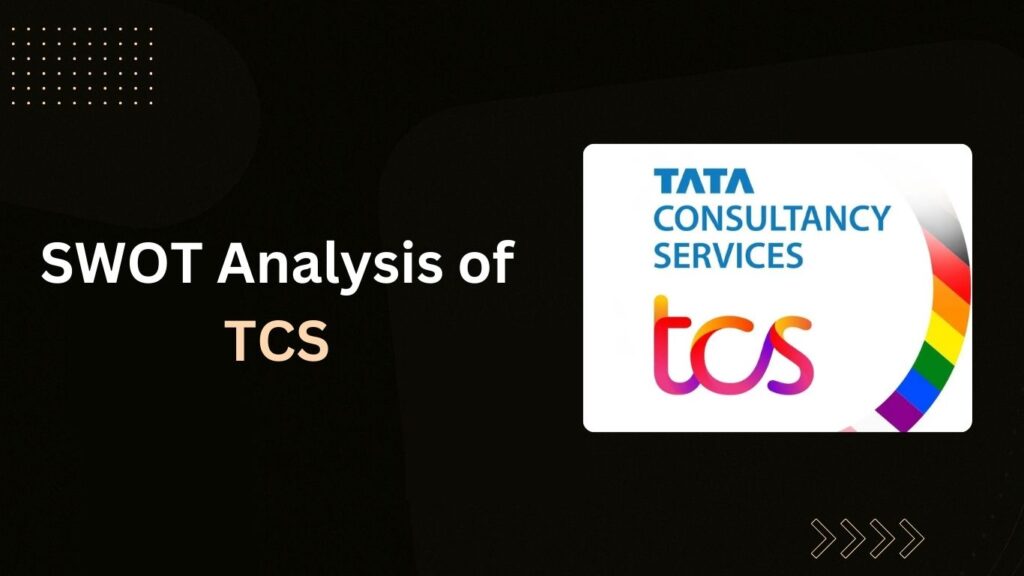Tata Consultancy Services (TCS) stands as a global IT services giant, known for its unparalleled expertise in technology and consulting. As one of the largest IT service providers worldwide, TCS has become a cornerstone of digital transformation for businesses across the globe.
Conducting a SWOT analysis for TCS not only highlights its current market standing but also offers critical insights into its long-term growth prospects and strategic direction.
Understanding its strengths, weaknesses, opportunities, and threats is vital for crafting effective business strategies and staying ahead in the competitive IT landscape.
Purpose of the SWOT Analysis
The primary purpose of a SWOT analysis is to assess a company’s internal strengths and weaknesses while identifying external opportunities and threats. This comprehensive evaluation provides a holistic view of a company’s position in the market, guiding strategic planning and decision-making processes.
For TCS, this analysis is particularly crucial as it navigates the rapidly evolving technology sector and strives to maintain its leadership in digital solutions, consulting, and IT services.
Company Overview
Founded in 1968 as a division of Tata Sons, Tata Consultancy Services has evolved into a global powerhouse in the IT industry. Headquartered in Mumbai, India, TCS operates in over 50 countries with a workforce exceeding 600,000 employees as of 2024. It has achieved remarkable financial success, generating approximately $30 billion in annual revenue for FY 2023. With a robust global presence and a diverse portfolio of services, TCS continues to set benchmarks in the IT sector, making it a preferred partner for digital transformation across industries.
Key Facts about TCS
| Founded | 1968 |
| Headquarters | Mumbai, India |
| Global Presence | Operations in over 50 countries |
| Employee Strength | Over 600,000 (2024) |
| Annual Revenue | Approximately $30 billion (FY 2023) |
| Brand Value | $19.2 billion (2024) |
| Industry | Information Technology & Consulting |
| Founder | J. R. D. Tata, F. C. Kohli |
| Net Profit | $5.219 billion (2023) |
Strengths of TCS
Extensive Global Reach:
TCS operates across five continents, making it one of the most geographically diversified IT service providers. This global footprint reduces its dependence on any single market and provides resilience against regional economic downturns.
For example, TCS’s partnership with the UK’s National Employment Savings Trust (NEST) highlights its ability to manage large-scale, complex projects globally.
Strong Brand Reputation: TCS is consistently ranked among the top IT service providers globally, with a brand value of $19.2 billion in 2024. This strong brand equity reinforces its credibility and customer trust, making it a preferred partner for digital transformation. For instance, TCS has been recognized by Gartner as a leader in the ‘Magic Quadrant for IT Services’, reflecting its market influence.
Diverse Service Portfolio:
TCS offers a wide range of services, including IT consulting, digital transformation, business process outsourcing (BPO), cloud computing, and cybersecurity. This comprehensive service lineup ensures its relevance across various industries.
For example, TCS’s partnership with Jaguar Land Rover supports their digital transformation journey, integrating AI and IoT to enhance customer experiences.
Robust Financial Performance:
TCS has a history of consistent revenue growth, high profit margins, and strong cash reserves, allowing it to invest in cutting-edge technologies. This financial strength acts as a cushion against market uncertainties.
For instance, TCS reported a revenue of $27.9 billion in FY 2023-24, reflecting its strong market position.
Strategic Partnerships:
TCS collaborates with industry leaders like Amazon Web Services (AWS), Adobe, and Dell, enhancing its ability to deliver integrated digital solutions.
For example, its partnership with AWS has accelerated cloud adoption for clients globally, providing scalable and cost-effective solutions.
Weaknesses of TCS
Dependence on Key Markets:
Despite its global presence, a significant portion of TCS’s revenue comes from the U.S. market, making it vulnerable to economic slowdowns and policy changes in this region.
For example, the U.S. accounted for over 50% of TCS’s total revenue in 2023, highlighting this dependency.
Talent Retention Challenges:
Managing and retaining skilled professionals remains a significant challenge in the highly competitive IT industry.
For instance, TCS reported an annual attrition rate of around 20% in 2023, impacting project continuity and increasing recruitment costs.
Limited Presence in Emerging Technologies:
While TCS is a leader in traditional IT services, it needs to strengthen its capabilities in emerging areas like blockchain, advanced analytics, and cybersecurity to maintain its competitive edge.
For example, competitors like Accenture and IBM have made significant strides in these areas, outpacing TCS in specialized solutions.
Opportunities for TCS
Digital Transformation Demand:
With businesses increasingly adopting digital-first strategies, TCS stands to benefit from this global shift.
For example, the global digital transformation market is projected to reach $1.8 trillion by 2025, presenting vast opportunities for companies like TCS.
Emerging Markets:
Developing regions, particularly in Asia and Africa, present significant growth potential as they invest in IT infrastructure and digital solutions.
For instance, TCS has expanded its presence in markets like India and South Africa, capitalizing on the digital growth wave.
Innovation in AI and Automation:
The rise of artificial intelligence and automation offers TCS the chance to enhance its service offerings and improve operational efficiency.
For example, TCS’s ‘Ignio’ platform uses AI to automate IT operations, reducing costs and improving service quality.
Sustainability Initiatives:
As businesses increasingly prioritize sustainability, TCS can leverage its expertise in green IT solutions.
For instance, TCS’s partnership with the UK government for the ‘Green Britain’ initiative demonstrates its commitment to sustainable digital solutions.
Threats to TCS
Intense Competition:
TCS faces stiff competition from global IT giants like Accenture, Infosys, Wipro, Cognizant, and HCL Technologies, all vying for the same enterprise clients.
For example, Accenture’s aggressive investment in AI and cloud services presents a direct challenge to TCS’s market share.
Regulatory Challenges:
Operating in multiple countries exposes TCS to complex and ever-changing regulatory requirements, adding to operational risks.
For instance, the evolving data privacy regulations in the European Union (GDPR) present significant compliance challenges.
Technological Disruptions:
Rapid advancements in technologies like AI, quantum computing, and blockchain can quickly render existing solutions obsolete, requiring constant innovation.
For example, the rapid rise of OpenAI’s ChatGPT has disrupted traditional customer service models, pushing IT firms to adapt.
Economic Uncertainties:
Global economic slowdowns, inflation, and changing geopolitical landscapes can impact client budgets and reduce IT spending.
For example, the global economic slowdown in 2023 led to reduced IT budgets across sectors, impacting service demand.
Key Competitors of TCS:
-
Accenture:
Known for its strong consulting and digital transformation capabilities. For instance, Accenture helped BMW enhance its digital sales and customer experience, significantly boosting customer satisfaction.
-
Infosys:
A major player in IT services with a focus on digital, cloud, and automation. Infosys collaborated with Rolls-Royce to develop AI-based digital solutions for real-time data analysis and predictive maintenance.
-
Wipro:
Offers a wide range of IT, consulting, and business process services. For example, Wipro partnered with Microsoft to accelerate digital innovation for enterprise clients through the Wipro FullStride Cloud Services.
-
Cognizant:
Focuses on digital transformation, cloud services, and AI-driven solutions. Cognizant supported Vodafone in launching a secure, cloud-based IoT platform, enhancing their connectivity services.
-
HCL Technologies:
Specializes in IT services and product engineering, with a strong focus on digital innovation. For instance, HCL helped Boeing develop mission-critical aerospace software, leveraging cutting-edge engineering and digital capabilities.
FAQs about TCS and its SWOT Analysis
What is the full form of TCS?
TCS stands for Tata Consultancy Services, a leading global IT services, consulting, and business solutions organization, headquartered in Mumbai, India. It is part of the Tata Group, one of India’s largest and oldest multinational conglomerates.
How does TCS maintain its leadership in the IT industry?
TCS maintains its leadership through a combination of innovation, customer-centric solutions, and operational excellence. It consistently invests in cutting-edge technologies like artificial intelligence, machine learning, cloud computing, and cybersecurity. For example, TCS’s Ignio™, an award-winning cognitive automation platform, helps clients optimize IT operations. TCS also focuses on a strong culture of continuous learning and upskilling, ensuring its workforce is always ahead in technology trends.
What are the major strengths of TCS?
Global Presence: Operates in over 50 countries.
Strong Brand Value: Part of the Tata Group, known for trust and reliability.
Diverse Service Portfolio: Includes consulting, IT services, engineering, and digital solutions.
Skilled Workforce: Over 600,000 employees globally, with a focus on continuous learning.
Digital Transformation Leadership: Trusted by major brands like Jaguar Land Rover for digital innovation.
How does TCS address the challenges of talent retention?
TCS focuses on creating a positive work environment, offering competitive compensation, and providing ample growth opportunities. It has programs like TCS Elevate and TCS Xplore that encourage professional development and career advancement. Additionally, TCS invests in employee wellness, work-life balance, and flexible work arrangements, which significantly improve retention rates.
What makes TCS a preferred IT service provider globally?
TCS is preferred for its reliability, scalability, and comprehensive service portfolio. It builds long-term relationships with clients, like American Express and Nestlé, by providing customized solutions, robust security, and seamless integration with emerging technologies.
How does TCS handle competition from companies like Accenture and Infosys?
TCS maintains a competitive edge through continuous innovation, cost leadership, and customer-centric approaches. It differentiates itself by focusing on deep industry expertise, strong client relationships, and investments in next-gen technologies. For instance, TCS’s BFSI (Banking, Financial Services, and Insurance) segment is a key area where it outperforms competitors like Accenture through specialized solutions and global delivery capabilities.
What is the SWOT analysis of TCS?
Strengths: Global brand, strong financials, extensive talent pool, diverse service offerings.
Weaknesses: High employee attrition, dependency on major markets like the US and Europe.
Opportunities: Digital transformation, cloud adoption, AI, and IoT.
Threats: Intense competition, economic slowdown, and cybersecurity risks.
Conclusion
TCS stands as a global IT leader with a strong brand reputation, extensive global reach, and robust financial performance. However, it must address challenges like market dependence, talent retention, and emerging technology gaps to maintain its competitive edge.
By leveraging growth opportunities in digital transformation, AI, and sustainability, TCS can strengthen its market position and continue its journey as a global technology leader. Understanding the strengths, weaknesses, opportunities, and threats facing TCS is essential for crafting effective business strategies and ensuring long-term success.

